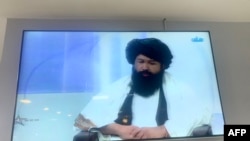A high-ranking Taliban official told a gathering of Afghan judges this week that the group outlaws any public opposition to the Taliban or its policies.
“All those who undermine the [Taliban’s] regime, whether that is via tongue, pen or practically undermining it, are considered rebellious and deserve death,” said the Taliban’s acting minister of higher education, Neda Mohammad Nadim, who spoke Sunday at the graduation ceremony of the Taliban’s judges and Islamic jurists in Kandahar.
He added that the Taliban would ‘suppress’ all those who are, according to him, “making problems for the people of Afghanistan based on foreigners’ agendas.”
Nadim's remarks contradict the Taliban’s spokesperson, Zabiullah Mujahid’s assurances that their government’s policy will be open to criticism and will listen and answer “any questions or objections with patience.”
So who is correct and what is the Taliban’s official policy on public dissent?
It’s still difficult to say.
In recent months, some prominent Taliban leaders have publicly disagreed with official policies issued by the group’s supreme leader.
The Taliban’s acting interior minister, Sirajuddin Haqqani criticized Hibatullah Akhundzada, the Taliban’s supreme leader, for “monopolizing power,” adding that the “situation can no more be tolerated.”
The Taliban, who seized power following the withdrawal of U.S. troops in August 2021, has formed an all-male government drawn from the group’s fighters despite promising to form a more inclusive administration.
But that has not led to a more coherent policy-making process, as various Taliban officials continue to contradict each other publicly.
Human rights watchdogs say regardless of what the Taliban has stated as official policy, the group’s actions have violated human rights, and suppressed minorities and political dissidents.
The Taliban have rejected the accusations.
Richard Bennett, the U.N. special rapporteur on human rights in Afghanistan, in his new report released last month, said that the Taliban government continues to fall back on using fear and repression to suppress Afghan communities.
“There is very little tolerance for differences, and none for dissent,” Bennett said.
Human rights violations
“The Taliban have mounted a ustained attack on human rights, persecuting minority groups, violently clamping down on peaceful protests, suppressing women’s rights and using extrajudicial executions and disappearances to spread fear among Afghans,” said an Amnesty International report released last year.
In an exclusive interview with VOA Afghan service, Bennett said that the Taliban’s repression of women is “a crime against humanity,” and individual members of the Taliban can be held accountable for it.
The Taliban has imposed strict restrictions on women, banning them from getting high a school or college education, prohibiting them from outside work and long-distance travel, and barring them from gyms and public parks.
"Afghanistan under the Taliban remains the most repressive country in the world regarding women's rights and it has been distressing to witness their methodical, deliberate, and systematic efforts to push Afghan women and girls out of the public sphere," said Roza Otunbayeva, the head of the U.N. mission in Kabul on March 8.
VOA Afghanistan Service contributed to this report.







